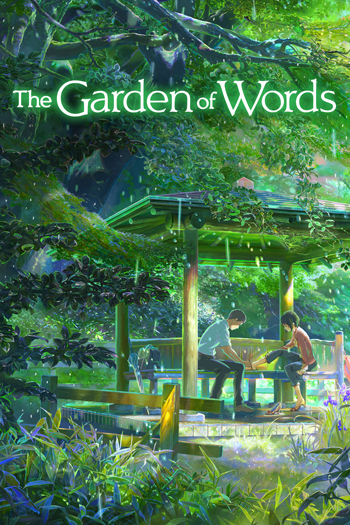By Andrew Hamlin
Northwest Asian Weekly

![]()
![]()
![]()
![]()
“The Garden Of Words” marks animator Makoto Shinkai’s fifth major work, and the only major criticism I can muster is that he doesn’t seem to like producing feature-length projects. Of the five, only two, “The Place Promised In Our Early Days” and “Children Who Chase Lost Voices,” run long enough to qualify as feature length. I’m wondering if he prefers the compactness of shorter stories, but it certainly has no effect on his ever-expanding mastery.
“Children Who Chase Lost Voices” was a fantasy story (with some science-fiction trappings thrown in) and allowed for plenty of fantastic creatures and landscapes. “The Garden Of Words” returns to an earlier idea of Shinkai’s, first expressed in his “5 Centimeters Per Second,” to tell a story with neither science fiction nor fantasy elements. In a genre, anime, where such elements usually dominate, this is a bold move.
The story opens with a teenage boy, Takao Akizuki (voiced in Japanese by Miyu Irino, in English by Patrick Poole), who lives with his mother and older brother. Takao is bright and ambitious, but something of a misfit at school. His ambition is to become a shoemaker, slightly odd in an era of mass-produced footwear. But Takao spends all of his spare time studying the intricacies of his chosen trade. He even acknowledges that he lacks natural talent and will have to work hard and make many mistakes, before achieving mastery —unusually insightful for one so young.
Takao decides to skip school one day — actually, he skips school fairly frequently, much to the chagrin of his family and teachers. This rainy morning, however, he passes through a local park and hides under a shelter to sketch shoe designs. There he finds Yukari Yukino (voiced by Kana Hanazawa and Maggie Flecknoe), a woman in her 20s, drinking beer.

As the story spins out, the two misfits find themselves forming an odd attraction to each other; an attraction foregrounded against the lushness of their surroundings. Shinkai opens with some Tokyo traffic scenes even brighter and more complex than his previous accomplishments in that area. His primary focus, though, settles on the park where the two always meet, with its lush trees, landscaping, and varying rhythms of rain, sometimes refracted through Takao’s transparent umbrella. (The gardens are actually modeled on Tokyo’s real-life Shinjuku Gyoen National Garden, although a disclaimer at the end of the DVD advises that in real life alcohol and tobacco use are forbidden on its grounds.)
Yukari Yukino is a mysterious person, perhaps wary of the age difference between Takao and herself. She confounds the young man by speaking in strange verse which turns out to be a tanka — an ancient Japanese poetry form, usually consisting of five lines in varying lengths.

To convince Yukari to speak back to him, Takao must search his memory for the rest of the tanka. Then he must put up with her odd and evasive behavior, even as he works to befriend her. Yukari has secrets, and as the anime’s 46 minutes roll on, Takao discovers a few.
The revelations will make him unpopular, even bullied, at school, where he’s already not terribly popular. The toxic nature of the schoolyard rumor mill threatens to overwhelm him.
Without spaceships, mecha suits, aliens, or fantasy monsters to work with, Shinkai focuses intently, and brilliantly, on the two characters, their escalating affection for each other, their respective dilemmas, and their struggles with their increasingly mutual dilemma. He works with nature until it effectively becomes a third character in the drama, especially the ever-shifting, increasingly poetic, patterns of the rain, mixed, eventually, with tears. “The Garden Of Words” marks another step forward for the master animator, and should inspire other artists to work with strictly dramatic stories in anime. (end)
“The Garden Of Words” is available on DVD and Blu-ray disc. Check your local video store for availability.
Andrew Hamlin can be reached at info@nwasianweekly.com.



